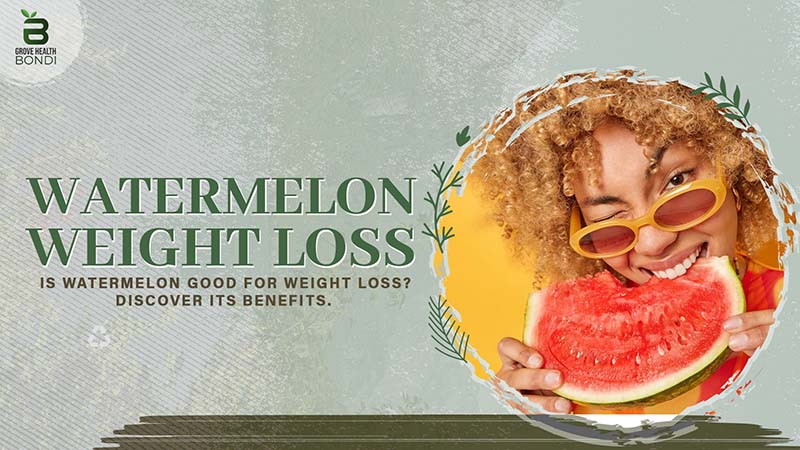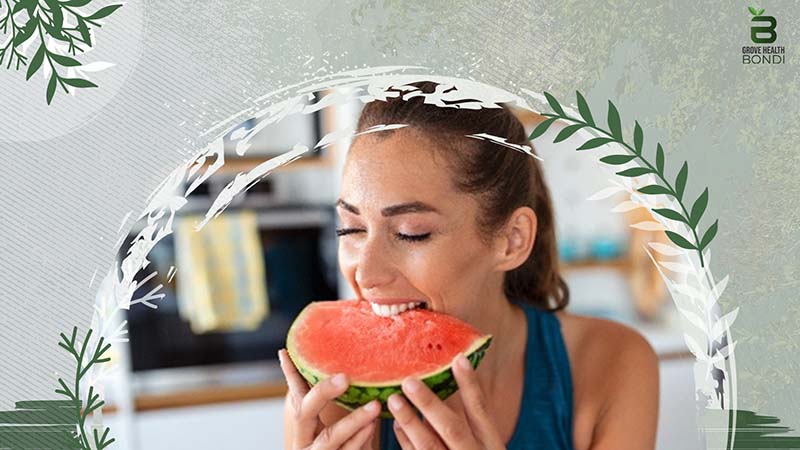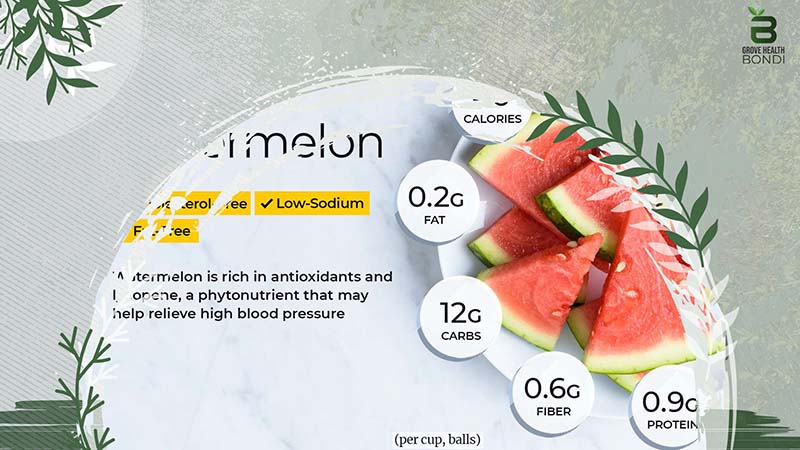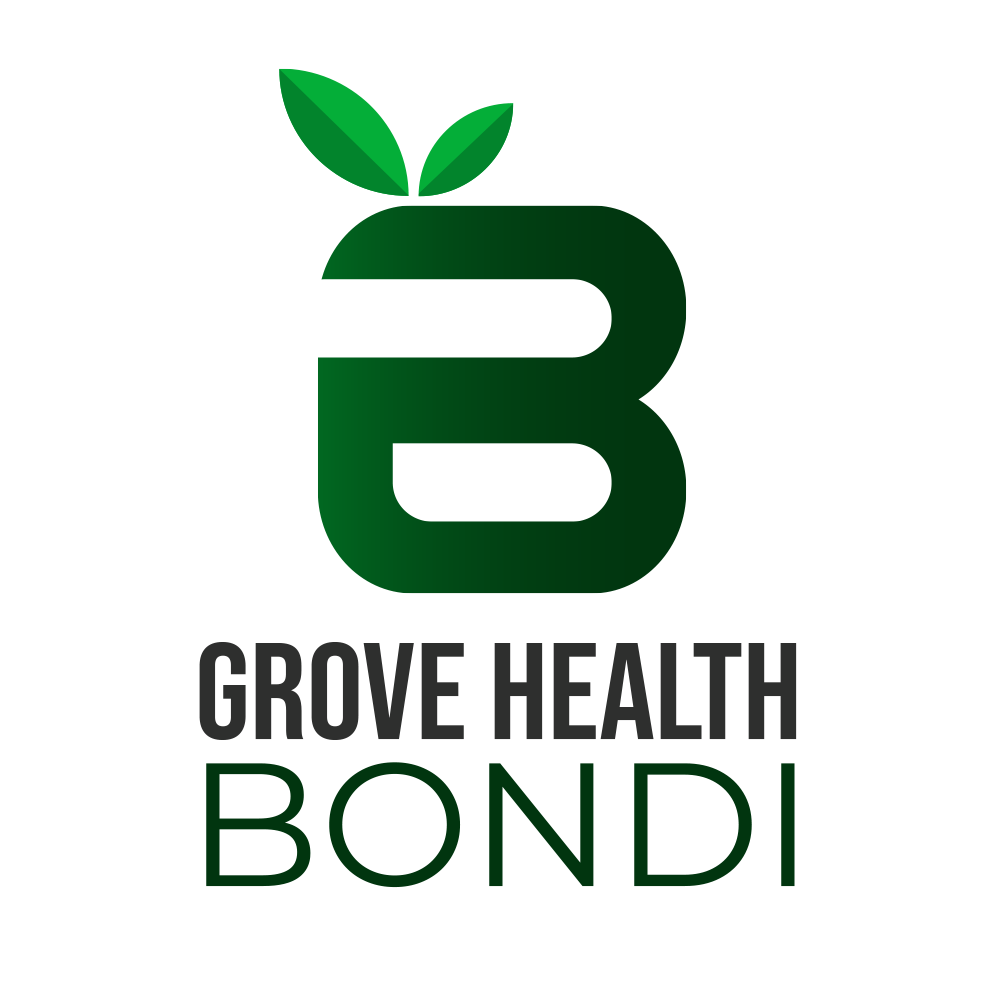When we think about weight loss, many of us immediately picture strict diets and intense workout routines. However, sometimes simply changing our daily eating habits can yield surprising results. One food that has garnered a lot of attention in weight loss diets is watermelon. So, “is watermelon good for weight loss?” is a question many people are asking. Join Grove Health Bondi as we explore the amazing benefits of this fruit for your weight loss journey in the article below!

1. Nutritional Composition of Watermelon
Watermelon is a fantastic source of nutrition, packed with essential vitamins, minerals, and plant compounds. Here are some detailed nutritional values of watermelon:
- Water: Watermelon contains a high amount of water, making up 91% of its weight.
- Energy: Every 100 grams of watermelon provides about 30 calories, supplying energy to the body.
- Carbohydrates: Watermelon contains 7.6 grams of carbohydrates per 100 grams, including glucose, fructose, and sucrose. An average slice of watermelon (286g) provides approximately 21.6 grams of total carbohydrates.
- Fiber: Watermelon is not a good source of fiber, providing only 0.4 grams per 100 grams.
- Protein: Watermelon contains little protein, only 0.6 grams per 100 grams.
- Fat: Watermelon contains almost no fat, only 0.2 grams per 100 grams.
- Vitamins and Minerals: Watermelon is a rich source of vitamin C and provides various other vitamins and minerals such as vitamin A, B-complex, C, and E, potassium, copper, and magnesium.
- Plant Compounds: Watermelon contains citrulline and lycopene, two beneficial plant compounds that help lower blood pressure, improve metabolic function, and reduce muscle soreness after exercise.

2. Benefits of Consuming Watermelon for Weight Loss
Watermelon is an excellent fruit for weight loss. Here are some key benefits of including watermelon in your weight loss diet:

2.1 Promotes Satiety
Watermelon is a fantastic fruit that can help you feel full without having to eat too much. This is primarily because watermelon contains up to 92% water. When you consume watermelon, the water content in this fruit helps keep your body hydrated, making you feel satiated for longer. This is particularly beneficial when you’re trying to control your portion sizes.
2.2 Low Caloric Content
Watermelon is an excellent choice for those seeking a low-calorie snack. With just 45 calories per cup of watermelon, you can enjoy it without worrying about weight gain. Moreover, replacing high-calorie snacks with watermelon not only helps you save on calories but also supports your weight loss process.
2.3 Enhances Workout Performance
Watermelon is a rich source of the amino acid citrulline, which can enhance the concentration of L-arginine in the blood – an important amino acid that helps the body produce protein. This leads to an increase in the production of nitric oxide, a substance that improves blood flow and supplies oxygen to the muscles, thereby enhancing workout performance.
Nitric oxide not only regulates muscle contraction and repair, but also helps alleviate muscle soreness. This is especially beneficial after high-intensity workouts, when ammonia and lactic acid can accumulate and cause muscle fatigue.
Citrulline is also believed to have the ability to reduce the concentration of ammonia and lactate in the blood, helping to improve exercise performance and reduce muscle soreness. This can help you work out longer and more effectively.
Research has shown that drinking 500 ml of natural watermelon juice can improve muscle soreness and restore heart rate within 24 hours. Therefore, watermelon is not only a delicious fruit, but also an important nutritional source that enhances your health and workout performance.
2.5 Helps Curb a Sweet Tooth
Watermelon, with its natural sugar content, can help curb your sweet cravings without resorting to high-calorie desserts.
Interestingly, even though watermelon is sweet, its sugar content is significantly lower compared to many other fruits. This makes watermelon an ideal choice for those who are monitoring their blood sugar levels.
2.6 Helps Burn Fat
Citrulline, a substance found in watermelon, has the ability to transform into arginine. Studies have shown that supplementing with arginine can reduce BMI, waist circumference, and body fat, while enhancing muscle mass. However, more research is needed to confirm these benefits.
According to Zeinali Khosroshahi M, Asbaghi O, Moradi S, and colleagues, supplementing with L-arginine impacts anthropometric indices and body composition in overweight or obese individuals.
Possibly, arginine has the potential to stimulate the growth of brown adipose tissue and thermogenesis. Brown adipose tissue, also known as brown fat, is a special type of fat that can generate heat, thereby increasing the number of calories the body burns.
2.7 Improves Digestion
Watermelon, with its significant water content, can provide substantial support for the digestive system. The water in watermelon helps food move easily through the digestive system, helping to reduce and prevent bloating. Moreover, water also helps break down food so that nutrients can be absorbed efficiently.
Simultaneously, watermelon also contains a certain amount of fiber, which helps eliminate accumulated waste in the digestive tract, thereby improving the health of the digestive system.
3. Calorie Content In Watermelon
Watermelon, with its exceptionally low calorie content, serves as an ideal choice for those pursuing weight loss goals. To illustrate, a mere cup of seedless watermelon (approximately 152g) provides you with just 46 calories. If you consider the weight, you’ll find that 100 grams of watermelon contains only 30 calories. This makes it a perfect addition to any weight loss diet.

4. Is Watermelon Good for Weight Loss?
Watermelon can support weight loss for several reasons. First, watermelon has a low calorie content, despite its sweetness, making it a better alternative to traditional desserts. Second, watermelon contains about 92% water, which not only helps keep the body hydrated but also makes you feel full longer, preventing overeating. Third, watermelon is a good source of an amino acid called arginine, which has been proven to help burn fat quickly. Fourth, the high water content in watermelon can support digestion and prevent bloating. Finally, watermelon also contains a small amount of fiber, which can improve gut health by removing accumulated waste in the digestive tract.
However, while watermelon can support weight loss, it should be combined with a balanced diet and a healthy lifestyle. Always consult a healthcare professional before making any significant changes to your diet.

5. Optimal Time to Consume Watermelon for Weight Loss
To optimize weight loss by eating watermelon, the timing of when you choose to enjoy this fruit is crucial. According to nutrition experts, the best time to eat watermelon is around 12-1PM, when the body’s digestion rate is high and active.
However, you should avoid eating watermelon or any fruit after 7PM. Watermelon has a mild acidic nature, and if consumed in the evening, it can slow down the digestion process when the body is inactive.
Additionally, you should limit your daily watermelon consumption to about 2 cups. For instance, if you eat a slice of watermelon in the morning, you can pair your lunch with three pieces of watermelon. Or you can have it as a snack in the afternoon before 5PM.
6. Effective Ways to Incorporate Watermelon into a Weight Loss Diet
Watermelon is a wonderful nutritional source that aids in weight loss, thanks to its high water content and low calories. Here are some suggestions for maximizing the benefits of watermelon in your diet:
- Watermelon Smoothie: Combine watermelon with other fruits and vegetables to create a nutrient-rich smoothie that provides energy to the body without causing weight gain.
- Watermelon Salad: Adding watermelon to your salad not only makes the dish more interesting but also helps you feel fuller for longer.
- Watermelon as a Snack: Watermelon is an excellent choice for snacks, especially after exercising, as it provides sufficient hydration for the body.
- Watermelon Juice: Watermelon juice not only quenches your thirst but also provides numerous nutrients to the body.
- Watermelon in Balanced Meals: Incorporating watermelon into your daily meals helps increase satiety without increasing calorie consumption.
However, remember that while watermelon can support weight loss, maintaining a balanced diet and regular exercise is still a crucial factor in achieving the best results.

7. Precautions When Using Watermelon for Weight Loss
Watermelon is a wonderful nutritional source that aids in weight loss, but there are a few things to keep in mind:
- Limit Consumption: Even though watermelon is low in calories, moderate consumption is still a crucial factor in ensuring sustainable weight loss
- Portion Control: The recommended portion of watermelon is about 1 to 2 cups per meal.
- Diversify Your Diet: If you’re not adhering to a watermelon-only diet, ensure that you consume a variety of other foods along with watermelon.
- Short-term Diet: A watermelon diet should only be implemented for a short period and should not be considered a long-term weight loss solution.
- Risk of Dehydration When Dieting: Watermelon is a good choice for a snack between main meals because it’s low in calories and high in water content.

8. Conclusion
So, the answer to the question “Is watermelon good for weight loss?” is yes, watermelon is an excellent choice for those seeking effective weight loss strategies. With its high water content, low calories, and fiber content, watermelon can become a significant part of your diet plan. However, to maximize the benefits of watermelon in weight loss, you need to combine it with a balanced diet, regular exercise, and patience throughout the weight loss process.

